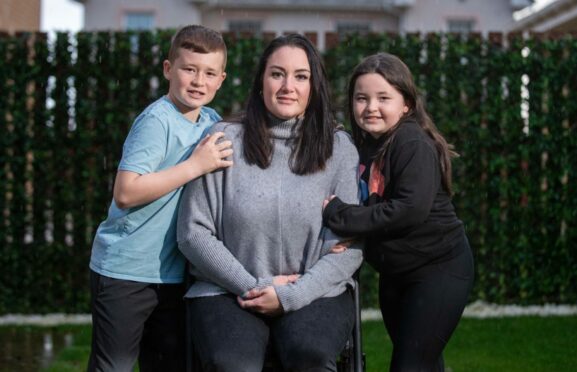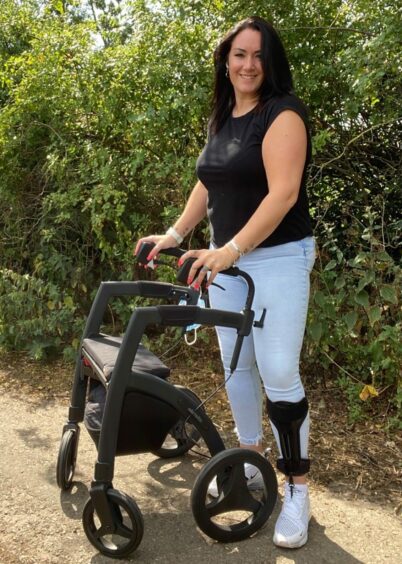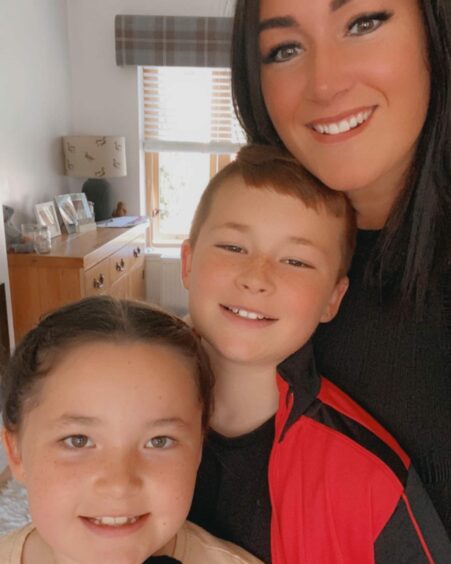A mother is having to “beg” strangers to help pay for potentially life-changing treatment in Mexico so she can continue to look after her two young children – despite it being approved for use on Scotland’s NHS three years ago.
Jade Taylor was diagnosed with primary progressive multiple sclerosis last February.
Since then she has gone from being a busy working mother, who spent several nights a week at the gym and enjoyed 17-mile bike rides, to relying on her children, Kaiden, 10 and Jiah, seven, to help care for her.
The type of MS she has is so aggressive the 38-year-old beautician now struggles with daily tasks, is in constant pain and relies on a walking aid to get about.
Her only hope of halting the progression is ground-breaking stem cell therapy, which was approved for use by Holyrood in 2019. It was agreed the NHS in Scotland would fund patients’ treatment in England, where it has been available for free for several years.
But despite having a 75% chance of responding well to treatment, she has been told she does not meet the criteria. Only certain patients with the relapsing-remitting form of the disease are eligible.
‘They’ve made it impossible’
Miss Taylor, from Culloden, near Inverness, said: “It’s not right. They’ve made it impossible for anyone to meet the criteria because MS affects everyone differently and is so unpredictable.
“In Mexico they have been offering this for 10 years and it’s available to anyone no matter if they have primary progressive, secondary or relapsing MS.
“Yes, this costs a lot of money, but is it not worth it for me to have a life with my children?”
Her current treatment drug Ocrevus, which she feels is having no effect, costs the NHS £19,000 a year, with infusions needed every six months and carries a risk of cancer and brain disease.
“It’s crazy,” Miss Taylor, who has set up the Highland MS Warriors group on Facebook, said. “By having HSCT [stem cell therapy] it could halt my MS for up to 10 years. Is that not going to save the NHS money?
“I’ve got a 75% chance of doing well yet I know there are some DMTs (disease modifying therapies) being offered (on the NHS) that have as low as a 35-40% benefit.”
She is scheduled to have the haematopoietic stem cell transplantation (HSCT) at the Clinica Ruiz in Mexico’s Puebla City on April 3.
Provided she can raise the money, her immune system will be wiped out with four rounds of intense chemotherapy, before it is “rebooted” using stem cells taken from her own blood. Afterwards, she will spend eight weeks in isolation.
She has already set aside her savings and in July, launched a GoFundMe page to raise the £56,000 required to cover the cost of the procedure, medication, scans and after-care.
So far more than £15,000 has been raised. Her son also swung into action at the weekend, taking part in the Highland Bridge Swing at Garry Bridge, near Pitlochry.
‘I have to take this into my own hands’
Miss Taylor said: “I’m having to beg people for money and I feel bad because they don’t even have it themselves. I’m finding it very hard. But this is what I’m having to do, I’m having to take it into my own hands.
“When I got my diagnosis I felt the NHS basically told me ‘you’ve got MS’ and left me to it.
“Now I’m hardly walking at all, I have to crawl up the stairs in the house and my children are basically my carers. When they go to their dad’s, I’m lost without them. I need to try this so I can have a life for me and my children.
“I’m not expecting to regain full mobility, but it has the potential to give me part of my life back; not to be in constant pain or be so tired all the time.”
Despite her rapid deterioration, she has also been denied the daily living component to her Personal Independence Payment, leaving her with no one to help her with daily chores.
She said: “The Scottish Government needs to get to grips with what’s going on.
“I’ve paid my taxes and National insurance. Even after having my children I went back to work after a couple of weeks. It’s so wrong.”
In Scotland every week at least 13 people are thought to be diagnosed with some form of MS, with the incidence higher than any other country.
Orkney alone is reported to have some 80 people living with the disease. That equates to 402 per 100,000 – more than 10 times the world average of 35.9.
A Scottish Government spokesman said: “HSCT can be considered for patients with highly active relapsing-remitting MS which has not responded to licensed treatment, as recommended by the Scottish Health Technology Group.
“Expertise in the use of HSCT to treat MS in Scotland is still developing. Although delayed by the need to focus resources on Covid-19, NHS National Services Division and the clinical neurology and stem cell transplant teams in Scotland are working together on planning the development of an HSCT pathway for eligible MS patients in Scotland.”



Conversation